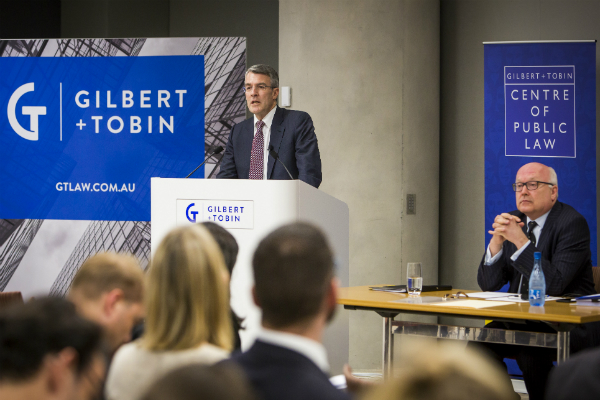Funding legal services focus of AG’s pre-election debate
The federal Attorney-General has gone head to head with his shadow counterpart at a pre-election legal affairs debate this week.

Attorney-General Senator George Brandis QC and shadow attorney-general the Hon Mark Dreyfus QC came up against each other at a pre-election debate hosted by the Gilbert + Tobin Centre of Public Law in Sydney this week.
The debate began with a question about funding certainty for the nation’s Community Legal Centres (CLCs), with the Attorney-General accusing Mr Dreyfus for igniting the "funding cliff" fiction.
"The end of terminating [CLC] funding on the 30 June 2017 was announced in the 2013 budget by Mr Dreyfus. It was Mr Dreyfus who decided that that funding would end after four years. Not me," Mr Brandis said.
Senator Brandis added that funding certainty for CLCs was assured over the next five years under the arrangements of the National Partnership Plan (NPA), a scheme which makes states and territories responsible for questions about the allocation and delivery of $1.6 billion of federal money.
"The NPA is a comprehensive agreement that gives the sector certainty over five years and will see funding increase by six per cent or $12 million over about five years – the total amount provided to all frontline services, including Community Legal Centres, will be $1.6 billion.
"The allocation of the $1.6 billion as between Legal Aid Commissions and CLCs is a matter to be determined by state and territory governments," Senator Brandis said.
Outcry across the sector followed the federal budget announcement in May, which revealed commonwealth funding for CLCs will be cut by a third, slashing an extra $34 million from an existing $100 million shortfall from 2017.
The NPA received a dim review from Mr Dreyfus, who suggested that less money for community legal services would result instead.
"The only certainty that the NPA provides to the legal assistance sector is the certainty that less funding is going to be provided to CLCs, to ATSILS and family violence prevention legal services," Mr Dreyfus said.
"It is completely wrong for a government, which says it is committed to doing more in the context of family violence to be committed, in fact, to reducing the funding that is available to CLCs for ATSILS and for family violence prevention legal services which stand at the front line," he said.
The director of the Kingsford Legal Centre, Anna Cody, who put the question of CLC funding to the politicians, said the Attorney-General avoided the issue.
"Senator Brandis dodged the question around funding and referred to previously committed funding and in fact the legal assistance including the CLC budget has been slashed remarkably and we will be losing a third of our funding, so I think that was obfuscating and hiding the reality of the funding cuts," Ms Cody said.
"Yes, there is some money but it is still not allocated, so it remains unclear how much CLCs will get and in what way that will be made," she said.
Funding questions about the dire state of Legal Aid’s federal resourcing were also put by Fiona McLeod SC, president-elect of the Law Council of Australia.
Senator Brandis conceded that the Coalition government had not responded to a Productivity Commission recommendation to increase commonwealth funding of Legal Aid by $120 million but said that the economic realities also bore out in Labor’s policy position.
"The Productivity Commission recommended that the Commonwealth increase its contribution by $120 million and the states and territories by $80 million. We haven’t committed to that, neither has the Labor party.
"Be that as it may, we have to prioritise and husband the scarce resources we have in the system, which is why I am unapologetic about prioritising work. We have, through the NPA, put in place a series of arrangements whereby the real levels of funding are maintained," Senator Brandis said.
In 2014 the Productivity Commission recommended an immediate injection of $200 million for civil legal aid alone and even more money to meet urgent service needs for criminal law divisions nationwide.
Mr Dreyfus countered the Attorney-General’s cash-strapped position by pointing to a number of other government funded initiatives.
"This is a government that can find $160 million for a divisive plebiscite, this is a government that can find $50 billion tax cuts for big business but it can’t find $200 million to fill the unmet need outlined by the Productivity Commission in a really excellent report, which I hope will assist in the ongoing argument for the funding of the legal assistance sector," Mr Dreyfus said.
The shadow attorney-general went on to stress that the cooperation of the states and territories was incumbent for federal pledges to legal aid.
"The reason for that, of course, is that we’ve seen conservative governments at the state and territory level who are prepared to further cut funding to their own legal aid commission. For the commonwealth to walk into a negotiation and say we’re putting more money on the table, without a commitment [that the states] will not make further cuts when money is provided by the Commonwealth; that’s essential to the negotiation," Mr Dreyfus said.
With the 2 July election day looming, Ms McLeod urged a serious commitment to Legal Aid from both sides.
"We have 14 per cent of the Australian population living under the poverty line and eight per cent of those can access Legal Aid services and have to go to court unrepresented. That’s 10,000 people a year unrepresented in courts," Ms McLeod said.
"When it comes to the funding of legal aid and the resourcing of courts, it comes to a question of whether the government is stepping away from the delivery of a really fundamental service – justice. Or is it prepared to stand in that space and deliver that service," she added.
Other political points were scored on ground covering a same-sex marriage plebiscite, the rate of indigenous incarceration, constitutional recognition, domestic violence, s 18C of the Racial Discrimination Act and federal judicial appointments.
Both the Attorney-General and Mr Dreyfus responded to questions from a panel comprising Ms Cody, Fiona McLeod SC, and Legal Affairs editor for The Australian, Chris Merrit. The event was organised by the Gilbert +Tobin Centre of Public Law.

Mark Dreyfus and Senator Brandis at the AG's Pre-Election Legal Affairs debate. Photo courtesy Anna Kucera.